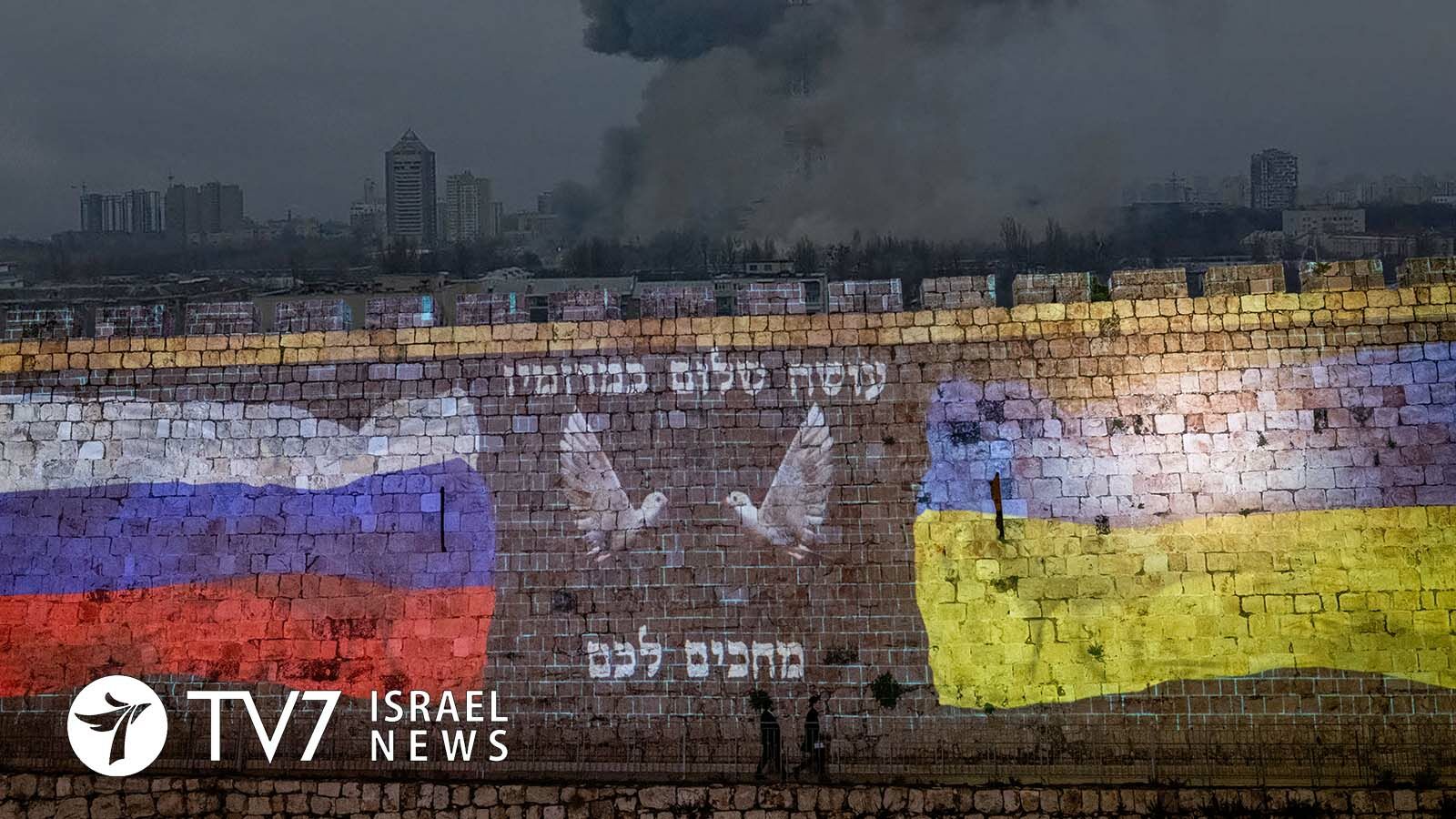The walls of Jerusalem’s Old City were illuminated with the national flags of both Russia and Ukraine in a symbolic display of Israel’s attempts to mediate the crisis via diplomacy.
By Jonathan Hessen and Erin Viner
The first line of the Hebrew text accompanying the images read “The maker of peace in the Heights,” which is the beginning of a frequently recited prayer that declares God as a peacemaker who will assert ‘peace on all’ including “His Nation Israel.” Below appeared the words “We are waiting for you,” ostensibly in reference to tens of thousands of Ukrainian refugees, Jews and Gentiles alike, who are making their way to safe haven in Israel.
Israeli Prime Minister Naftali Bennett held a phone conversation with Russian President Vladimir Putin for approximately an hour and a half last night. Discussion focused chiefly on strategies to reach a ceasefire, alongside Israel’s decision to ratchet-up its humanitarian aid for Ukraine.
A statement issued by the Kremlin said that Bennett had initiated the conversation and that he had updated President Putin on his most recent talks with several heads of state.
The Israeli Premier subsequently held a phone conversation with Ukrainian President Volodymyr Zelenskyy, who later described the talks as “important” as “part of a negotiation effort to end this war as soon as possible with a fair peace.”
The Ukrainian President added that he also discussed attempts to end the fighting with European Commission President Ursula von der Leyen, Polish President Andrzej Duda and Luxembourg Prime Minister Xavier Bettel with “100% mutual understanding;” and that the Ukrainian delegation would continue negotiations on the matter with Russian representatives.
When asked at a press conference yesterday about Israeli attempts to broker a ceasefire, President Zelenskyy responded: “I personally am for any mediation, I do not mean to say Mr. Bennett is just anyone, I think he can play an important role.”
In related developments, Israeli Prime Minister Bennett announced his government’s approval of the building of a field hospital in western Ukraine in an effort being led by the Foreign Affairs (MFA), Health and Finance Ministries.
According to a statement TV7 obtained from the MFA, the ₪ 21 million shekel ($6.4 million or €5.83 million) facility is expected to treat around 100 patients a day, featuring an emergency room, in-patient wards and maternity ward, a medical lab and an imaging department.
The Israeli hospital will be named Kochav Meir (the “Shining Star of Meir” in Hebrew) in tribute of former Prime Minister Golda Meir. The late leader was born in Ukraine and the founder of the State of Israel’s Mashav national aid agency for International Development Cooperation at the MFA.
Bennett also unveiled an new Cabinet-approved plan for the integration of new immigrants “from Ukraine, Russia and the countries of the region.”
“Israel is part of the world and the world is going through difficult and tumultuous times. We are managing this complex crisis with sensitivity, responsibility and are making an effort to offer assistance however we can,” said the Premier, adding that the government is preparing to great new citizens “with the entire package that the state needs to provide” including “housing assistance, education and especially a big hug.”
“As a people and a society,” said Bennett, the Jewish State will also offer humanitarian assistance to Ukrainian nationals “who are here temporarily, for a few weeks or months, until the situation there calms down,” including individual hosting of refugees by many Israeli families.
Israeli Defense Minister Benny Gantz also expressed the nation’s deep commitment to helping Ukrainian refugees.
“The nation of Israel, which knew persecution, and knows maybe better than any other nation the meaning of the term “refugee” cannot merely observe the suffering of those feeble people,” Jerusalem’s top defense leader said during an address at the Begin Conference for National Security.
“In this spirit, we are marching with those arriving from Ukraine. We promise a house for every Jew around the world when this is required, and are acting in a humanitarian manner with an open heart,” he added.
